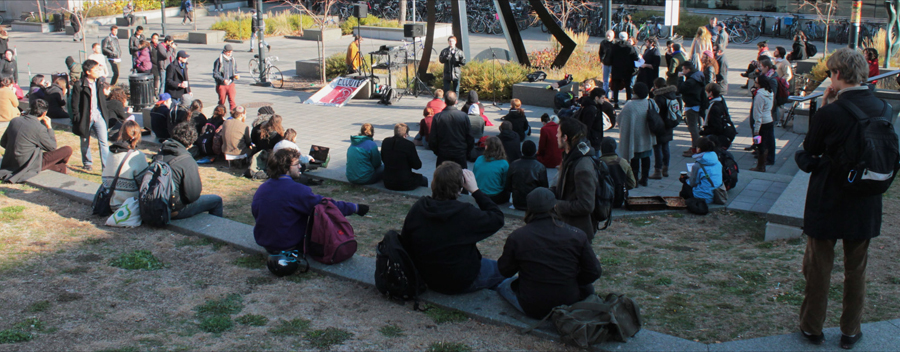Last Friday, students gathered in James Square to hear a series of presentations on the historic and present challenges faced by McGill. Student and faculty speakers presented on topics including unions, disciplinary charges from last spring’s student demonstrations, and the question of the democratic nature of the university’s structure.
The Post-Graduate Students’ Society of McGill University (PGSS) and the Students’ Society of McGill University (SSMU) organized the event as a commemoration of International Students’ Day, which falls on Nov. 17. According to PGSS Vice-President External Errol Salamon, the event also allowed students to reflect on the events of Nov. 10, 2011, when an occupation of the James Administration Building ended with riot police dispersing students on campus.
“There are still long-standing issues from the 2011-2012 academic year that haven’t been resolved,” PGSS Vice-President External Errol Salamon said. “This event ties into International Students’ Day because it enables not only students, but also other members of the McGill community to share … their local struggles and issues, many of which are common struggles.”
As examples of these ongoing struggles, Salamon pointed to the Quebec debate on tuition, as well as the academic disciplinary charges that some McGill students still face for participating in non-violent protests during the Winter 2012 semester.
Former SSMU Vice-President External Joël Pedneault gave a presentation that emphasized the importance of continuing to raise awareness about those who face ongoing disciplinary action or criminal charges for their participation in student protests. He received a ticket for participating in a demonstration last year.
“It’s important not just to ask for a general amnesty,” Pedneault said. “That seems like the most obvious thing … but the danger of formulating demands in that broad, sweeping way is that they could easily be taken halfway by those who have the power to decide who gets criminalized and who doesn’t.”
Pedneault said it is more important to spread information about those who have been banned from the island of Montreal, or who face jail time for cumulative charges.
Another presenter, Justin Marleau, stressed the importance of unions on campus. As the vice-president Teaching Assistants for the Association for Graduate Students Employed at McGill (AGSEM), Marleau said unions help to address the problems caused by the high student turnover rate at universities, which results in a lack of institutional memory among student organizations.
“We need to fight this administration every single day, for every single right that we should have,” Marleau said. “Every time we negotiate a new collective agreement they cut our hours, and they like to justify it with budget cuts. … But it has nothing to do with money. It has to do with what they care about—nice buildings, fancy facilities, HD TVs all throughout campus, with nothing about the quality of education for undergraduate and graduate students at McGill.”
Although the event was held in part to commemorate International Students’ Day, some speakers pointed out that struggles at McGill are not confined to students. Thomas Lamarre, a professor in East Asian studies, said the way McGill is run affects faculty as well as students.
“At McGill, we’re given an image that the form that our struggles should take is democracy—that we are supposed to go and sit in meetings, deliberate, pass bills, and vote on things,” Lamarre said. “But the truth is, a university is not structured like a democracy. So when we’re told that if we behave, it will become democratic, it’s simply a lie. It simply misdirects all of our energy from the actual struggle.”
Lamarre concluded by calling on students and faculty to stop “pretending” the university is a democracy.
McGill Dean of Students Andre Costopoulos attended the event, and said he thought the speakers made relevant points about the university’s history and community.
“Unfortunately, sometimes the way those important points are expressed doesn’t favour dialogue,” he said. “For example, some of the speeches started with [personal] attacks instead of focusing on the issues at hand. But the issues and the points themselves are important and should be considered.”
Throughout the presentations, students frequently expressed their support by cheering. Isaac Stethem, U3 arts, said he appreciated the presenters’ comments, and emphasized the importance of encouraging dialogue about challenges at McGill.
“I thought it was really important to remember what happened on campus last year … but also to remember that it’s not just about one thing that happened a year ago,” Stethem said. “It’s about … continuing the struggle to make the university more democratic [and] to make it more responsive to the needs of students and faculty.”







